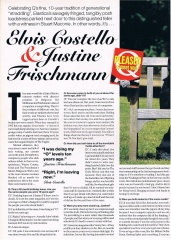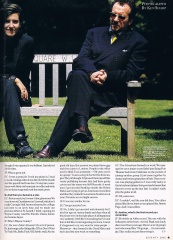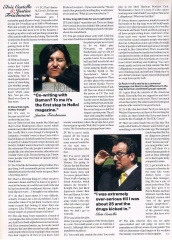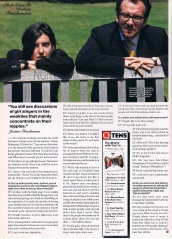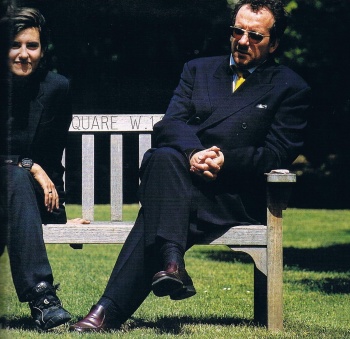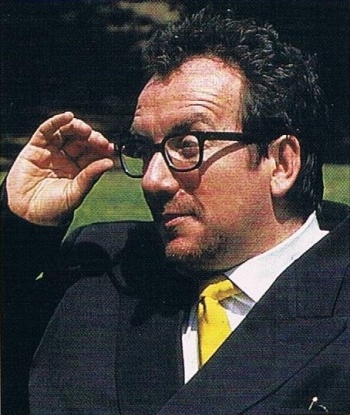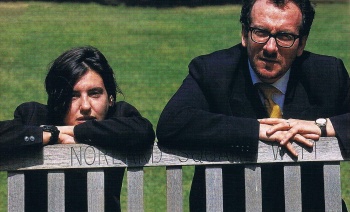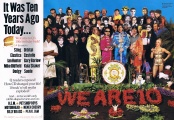Q, October 1996: Difference between revisions
(add transcribed text first 100 words) |
(add next 1300 words of transcribed text) |
||
| Line 4: | Line 4: | ||
{{:Magazine index}} | {{:Magazine index}} | ||
{{Bibliography article header}} | {{Bibliography article header}} | ||
Celebrating Q’s fine, 10-year tradition of generational “straddling”, Elastica’s savagely fringed, tangibly posh leadstress parked next door to this distinguished feller with a witness in Stuart Maconie. In other words, it's ... | |||
<center><h3> Elvis Costello & Justine Frischmann </h3></center> | <center><h3> Elvis Costello & Justine Frischmann </h3></center> | ||
<center>''' Pleased To Meet You </center> | <center>''' Pleased To Meet You </center> | ||
| Line 10: | Line 12: | ||
<center> Stuart Maconie </center> | <center> Stuart Maconie </center> | ||
---- | ---- | ||
{{Bibliography text}} | |||
They may sound like a firm of luxury raincoat makers with discreet premises in Belgravia but McManus and Frischmann’s shared occupation is songwriting. They’re the products of different eras, but their words are similarly shrewd and acerbic, and Elastica have been tagged natural heirs to Costello’s brainy new wave mantle. When they emerged in 1992 this was angular, wired music – a victory of sneers and sharp tailoring over America’s lumpen grunge rump. Costello had been there 20 years earlier when, as pigeon-toed avenging nerd, he had tried in a series of three-minute salvos to lay waste the languid empire of The Eagles. | |||
Mutual admirers, they were keen to meet and talk of lyric writing, our cousins across the pond, Dictaphones, computers, people who stick address labels to their correspondence, Wayne County, Oasis and the Frenchmen’s Motel, Fishguard. With a few of the more obscure avenues blocked off as unsafe for pedestrians, this is the route their conversation took… | |||
'''Q: This is Q’s tenth birthday issue. Are you the same people you were 10 years ago?''' <br> | |||
EC: I fucking hope not. I dunno. I’ll leave you to decide. Q’s not the same magazine it was ten years ago so it that’s changed it would be stupid if the people you write about hadn’t. <br> | |||
JF: I’m definitely not the same. I was doing my “O” levels ten years ago.<br> | |||
EC: Right, I’m leaving ''now''. Actually I don’t think I changed all that much. I was the same from being fourteen till I was in my mid-twenties. <br> | |||
JF: A late developer.<br> | |||
EC: Oh yeah. I was extremely over-serious till I was about twenty-five and the drugs kicked in.<br> | |||
'''Q: Success came to both of you at about the same age, didn’t it?''' <br> | |||
JF: You can’t compare the two of us. We’ve only had one album out. But, yeah, I was twenty-three when I had my face on the cover of a magazine.<br> | |||
EC: Ah, I can trump you there. I was in fact twenty-two. But I used to tell the truth then. [[Rolling Stone]] asked me how old I was and I said twenty-two rather than twenty-two and three-quarters like you to at school to appear more mature. My birthday was a few days afterwards. And so still in the biographies I’m a year younger than I actually am, which now at my age is handy. You still see things about me that say I was born in ’55 but it was ’54. Not that I give a shit. <br> | |||
'''Q: How did you both take to all the inevitable media attention?'''<br> | |||
EC: I only did about five interviews actually and then I quit and didn’t do any more for about five years. They didn’t seem to write anything I said so I didn’t see the point. But I did one for the Daily Mirror and that was fantastic. They sent one of the hacks like out of Spitting Image and he was horrible and like, So what about the girls then? It was so clichéd. All he wanted was salacious stuff. So I packed it in. I realised after a while that if you got drunk with them you could make stuff up, so I made up a load of stuff and that sort of did me for the next four or five years. <br> | |||
'''Q: Were you any more clued-up Justine?'''<br> | |||
JF: I was fairly clued-up but I was stupid enough to tell the truth. I fell into the trap of thinking I’m just talking to a mate rather than thousands of people, and that what you’re saying will be used selectively. It’s hard to come to terms with that.<br> | |||
EC: American magazines like Vanity Fair – if they profile you they shadow you for, like, six months so they can see you in every conceivable light. It’s ridiculous. I never like having journalists around on tour and stuff because they get bored and they start commenting on the fruit arrangements backstage as if it’s somehow revealing. I had this guy from the Washington Post on the last tour and he wrote this ridiculous melodramatic piece about what was basically just a bad gig. And he did it purely because he was bored. I don’t blame him for being bored. Hanging around with bands is boring by and large.<br> | |||
'''Q: Were you both students of the music media?'''<br> | |||
EC: It was what I lived for. Seriously, I was working in an office until a week before my first record came out. Literally. I read the papers all day long because I was a computer operator and no-one realised that the computer did all the thinking. I wore a white coat and people thought I was a rocket scientist because I was the only person in the building who could work the machine. That’s how specialist it was. Now everyone’s got one at home. It was as big as this room, like the Billion Dollar Brain, flashing lights and everything. Everyone thought I was a genius. It was brilliant. I just skived all the time.<br> | |||
JF: What a great job.<br> | |||
EC: It was a great job. I took my guitar in. I used to work evenings when it was the end of the month and the payroll stuff was due. I’d stay late, sometimes work thirty-six hours just on coffee and write two or three songs and read the music press.<br> | |||
'''Q: And then you became a star.'''<br> | |||
EC: Pretty much, but it wasn’t that glamorous. We went down to Davidstowe in Cornwall, which isn’t really [[Carnegie Hall]], but we rehearsed in a village hall next to an army base and we made our glorious debut at [[Concert 1977-07-14 Penzance|St Austell]], I think, opening for [[Wayne County & the Electric Chairs|Wayne County And The Electric Chairs]], before she became Jayne.<br> | |||
JF: Who’s Wayne County?<br> | |||
EC: He was a Max’s [[Kansas City]] sort of person. He had songs called things like If You Don’t Want To Fuck Me, Baby, Fuck Off. Subtle stuff. Ah the good old days. But anyway, we played three gigs and then came to London. People in the office used to think I was a fantasist – “Oh yeah, you’re in a group.” I was in a day job for the first three singles. They all thought I’d pressed them myself like vanity publishing because they had these geeky covers and the name was Stiff Records. A week later I got arrested for busking outside the [[Concert 1977-07-26 CBS|Hilton Park Lane]] trying to get an American record deal and then they realised I was serious. So after seven years I became an overnight success.<br> | |||
JF: It was very similar for me.<br> | |||
EC: You got arrested too.<br> | |||
JF: No, I didn’t get arrested unfortunately but I tried for ages in various bands and then when all the pieces were in the right places it all happened very suddenly. It felt like it was taking forever and then it felt like it was happening too soon. I mean it’s happened very, very soon for some people… Menswear – they formed in the Good Mixer and had a deal the next week or something.<br> | |||
EC: [[The Attractions]] formed in a week. We managed to con a major record label into flying [[Pete Thomas]] back from California on the pretext of joining another group. It just came together by chance and it was a great piece of luck. Then everyone was playing guitars so I was really lucky to find a keyboard player that good and a bassist that fluent to cover up the fact that I couldn’t really play the guitar at all.<br> | |||
JF: Oh, come now.<br> | |||
EC: I couldn’t, not like you did then. You either played like Steve Jones or you played like [[Jimmy Page]]. And I was neither.<br> | |||
''' | |||
Q: Justine, what’s the first record you remember.'''<br> | |||
JF: Probably an [[ABBA|Abba]] record. The one with the helicopter on the front – Arrival. Punk rock I only discovered four years ago. There’s a lot of groups now who sound like ‘70s groups… it’s not nostalgia. They really are just discovering it. | |||
''To be continued...'' | ''To be continued...'' | ||
Revision as of 21:28, 23 October 2013
|
